Getting qualified for a mortgage can already feel daunting, but for someone who’s self-employed, it can feel impossible. Traditional lenders rely on W2s, pay stubs, and tax returns to verify income, which often leaves self-employed individuals struggling to prove their financial stability. Fortunately, there are mortgage options built specifically for self-employed individuals– no W2s or pay stubs required. The key is finding a lender who understands your unique challenges.
At Defy Mortgage, we specialize in providing creative solutions to self-employed individuals, real estate investors, 1099 contract workers, entrepreneurs, business owners, and anyone else whose unconventional income streams may make it more difficult for them to get a mortgage. With our competitive rates, dedicated end-to-end support, and 75+ fully customizable non-traditional mortgage options, we’re confident that we can give you the financial tools you need to succeed.
In this guide, we’ll showcase the best mortgage lenders for self employed individuals. Each provider has years of experience working with self-employed borrowers. Below, we’ll highlight their strengths and unique offerings to help you choose the right match for your financial goals.
What is a Self-Employed Mortgage?
Self-employed mortgages are a category of mortgages that cater specifically to the self-employed, freelancers, entrepreneurs, or anyone with an irregular or non-traditional source of income. The best mortgage lenders for self employed individuals consider a larger range of income documentation, making qualification for self-employed individuals easier.
There are many myths about self-employed mortgages. Contrary to those common beliefs, self-employed individuals can absolutely qualify for mortgages using bank statements, profit and loss statements, business financials, and even the property’s rental income pending that they meet the required loan criteria like FICO score, down payment requirements etc. Lenders use these alternative documents in place of traditional income documents to determine that the borrower makes enough income to repay the loan. That said, if you are a self-employed individual looking to purchase or refinance, you have options. The banks might not tell you this, but we will.
Anyone who has an irregular or non-traditional source of income could benefit from a self-employed mortgage to achieve their homeownership goals. Some examples of these individuals are:
- Self-employed Individuals
- Freelancers
- Gig Workers
- Small Business Owners
- E-Commerce Professionals
- Independent Contractors
- Real Estate Investors
- Artists
- Doctors in Private Practice
- Self-Employed Lawyers
- Individuals With Multiple Streams of Income
- Truck Drivers
- Individuals with unique circumstances who would not be able to qualify for a traditional mortgage
If you’re self-employed and interested in qualifying for a mortgage, contact us and we will help you navigate this process.
If you are a mortgage broker with a bunch of self-employed client’s, we also have to wholesale mortgage business where we specialize in loan options for business-owners, entrepreneurs, gig-workers, hourly wage earners, real estate investors and more.
How Was This List Formed?
We considered several factors to help determine who the best self employed mortgage lenders are in the industry. We update this list every year to reflect the latest changes, including employees’ experience, reviews, rate transparency, brand awards, and more.
Please note that this list is in no particular order.
The Top 15 Self-Employed Mortgage Lenders of 2025
1. Defy Mortgage
Defy Mortgage is a rising star in the non-QM mortgage industry, founded with a mission to elevate the mortgage experience for non-traditional borrowers. For self-employed individuals, qualifying for a home mortgage shouldn’t be a challenge. With Defy at your side, it never will be.
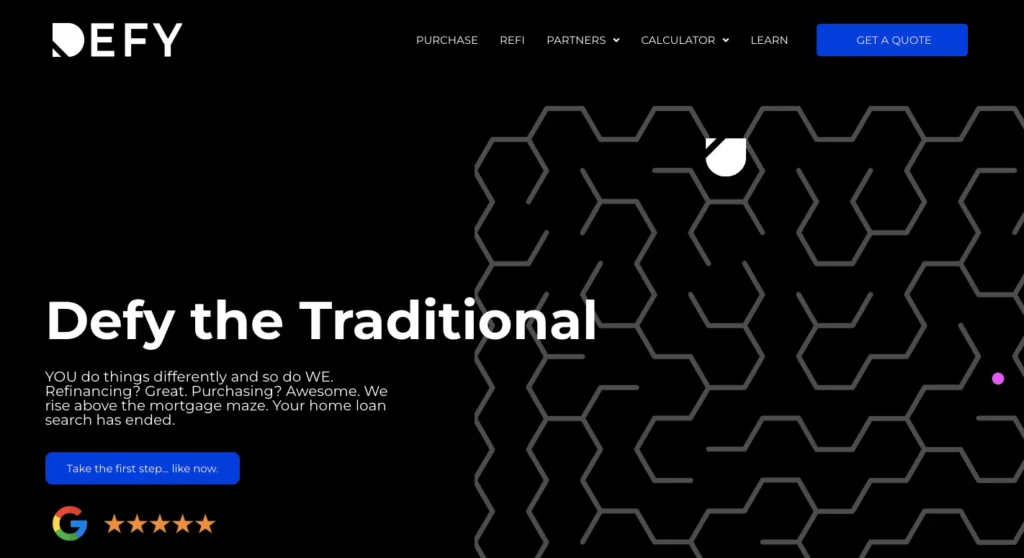
Loan Types Offered: Bank Statement Loans (personal or business), Profit & Loss (P&L) Loans, DSCR Loans (qualify using rental income!), Asset Depletion Loans, Interest-Only Loans and MORE.
Minimum Down Payment: Up to 90% LTV for those who meet certain criteria.
Credit Score Range: As low as 620 FICO.
Pros:
- Over 75 different loan programs to help your clients solve the most challenging scenarios, including Bank Statement options from 12-24 months
- Flexible LTV options and large loan amounts
- 1099/Gig-worker lending options
- Interest-Only options with no principal paydown
- Primary, second, investment property loan options
- 25+ years of experience delivering valuable insights and seamless solutions to clients and mortgage brokers
- DSCR options in 35+ states for real estate investors
Cons:
- Not available in Alaska, Arizona, Arkansas, Idaho, Michigan, Minnesota, Nevada, New Jersey, North Dakota, Oregon, Utah, Vermont, or Virginia.
We take a full 360-degree look at your unique finances, goals, and background. Not just judging you by some standard checklist. The Defy Mortgage team factors in all aspects to craft mortgage options that actually fit your lifestyle. Simple home loans, fast pre-approval times, easy application processes, and no obligation or application fees ever when you apply. If you need a home loan, Defy has self-employed mortgages for you.
2. North American Savings Bank (NASB)
Loan Types Offered: Bank Statement Loans, 1099 Mortgage Loans, Asset Depletion Mortgage, DSCR Loans, Investment Property Loans, FLEX Loans, Non-Conforming Loans.
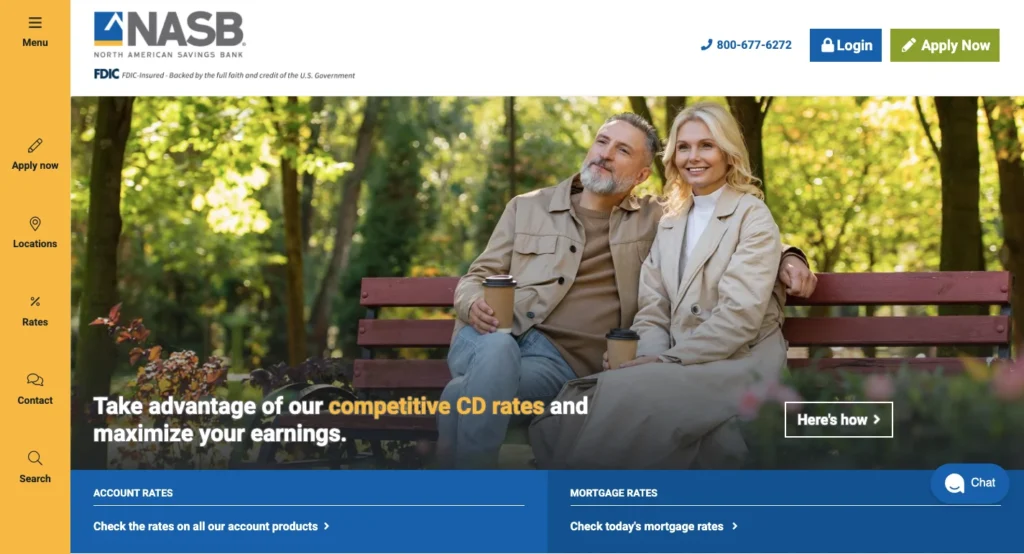
Minimum Down Payment: As low as 10% (20% for most programs)
Credit Score Range: 660-700+
Pros:
- Portfolio lender with in-house underwriting for faster decisions
- Offers Zero Down Home Loan for first-time homebuyers and borrowers with 700+ credit
- Clean regulatory record with no CFPB complaints in 2023
Cons:
- Higher mortgage rates and origination fees compared to competitors
- Limited to $1.25 million maximum loan amounts
- Requires at least 2 years of self-employment
- Requires 12 months of consecutive bank statements from the same account
3. Truss Financial
Loan Types Offered: Stated Income Mortgages, Bank Statement Mortgages, Debt Service Coverage Ratio (DSCR) Mortgages, Asset Depletion Mortgages, No Doc Mortgages, Fix-and-Flip Loans .
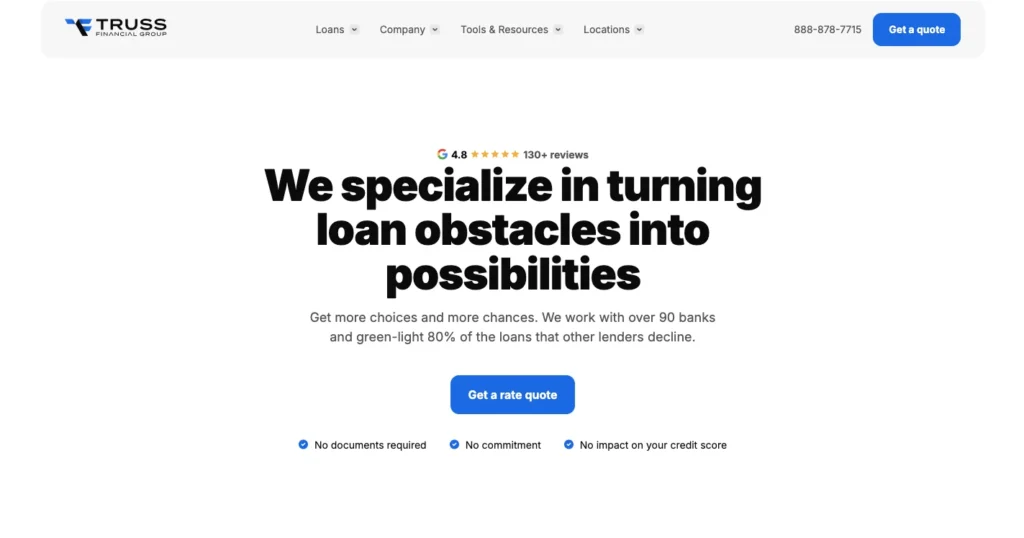
Minimum Down Payment:
Credit Score Range: Good (670-739) credit for most self employed mortgages. Specific score varies according to other factors.
Pros:
- Offers 30 or 40-year fixed mortgages.
- Interest-only payment options for the first 10 years.
- No tax return requirement.
Cons:
- Specific credit score requirements not disclosed.
- Limited information on down payment requirements.
4. Angel Oak Mortgage Solutions
Loan Types Offered: Bank Statement Loans (including Elite up to $3 million), DSCR Loans, Bank Statement HELOCs, 1099 Income Loans, Profit & Loss (P&L) Loans, Asset Qualifier, ITIN Mortgage Loans, Foreign National Loans.
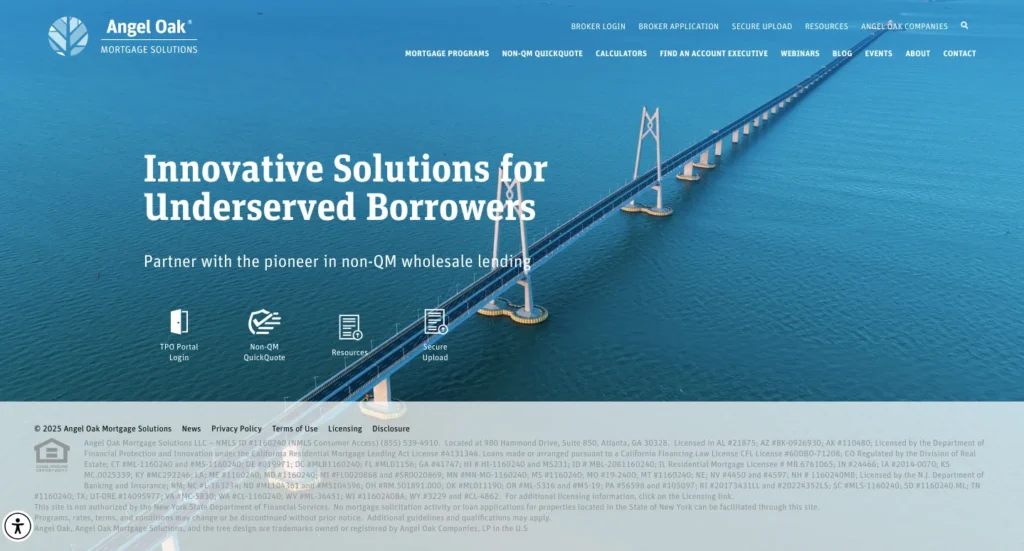
Minimum Down Payment: Generally 25%, but can be as low as 10% with a high enough credit score.
Credit Score Range: Depending on the loan program, 640-700 for 75%-80% CLTV, 720 to avail the max LTV of 85-90%.
Pros:
- Offers loans up to $3 million with Bank Statement Elite.
- Wide variety of non-QM loan options.
- Works with borrowers who have partial business ownership, not just sole proprietors.
- Bank statement HELOCs.
Cons:
- Since they’re a wholesale-only lender, you need a broker to borrow from them.
- No direct contact with Angel Oak.
- Possibility of mortgage broker fees.
5. New American Funding
Loan Types Offered: HELOC, DSCR, Bank Statement, Cash-out Refinance, Construction Loans, and Jumbo Loans.
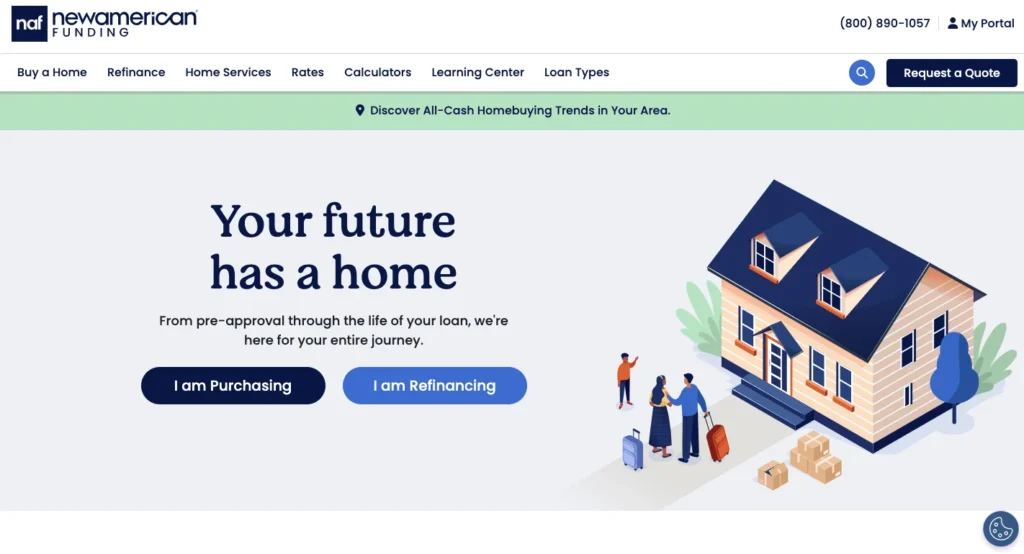
Minimum Down Payment: Generally 20%, but can be as low as 10%
Credit Score Range: 620-740.
Pros:
- Focuses on serving underserved communities through homeownership programs.
- Offers a 12-month bank statement program.
- Provides an asset qualifier program.
Cons:
- Requires a minimum of two years of self-employment history.
- Tax return and business bank statement documentation required.
6. CrossCountry Mortgage
Loan Types Offered: DSCR loans, Bank Statement Loans, Asset Qualifier Mortgages, Full Doc Loans, Investor Cash Flow Loans, Alt Doc-1099 Mortgage Programs.
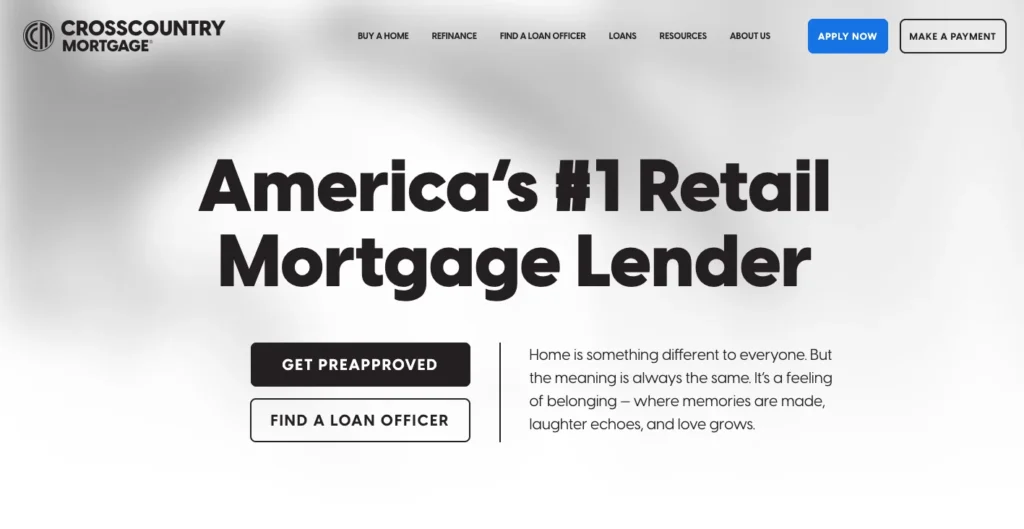
Minimum Down Payment: As low as 10% for most options, 15% for DSCR.
Credit Score Range: 620-640.
Pros:
- DTI ratio up to 50% and loan amounts up to $3 million.
- Available in all 50 states plus DC.
Cons:
- Complex underwriting for challenged credit profiles
- Limited loan amounts for lower-tier programs.
7. Griffin Funding
Loan Types Offered: Bank Statement Loans, Profit & Loss (P&L) Loans, DSCR Loans, Foreign National Loans (including ITIN Mortgages), Asset-Based Loans, Interest-Only Loans.
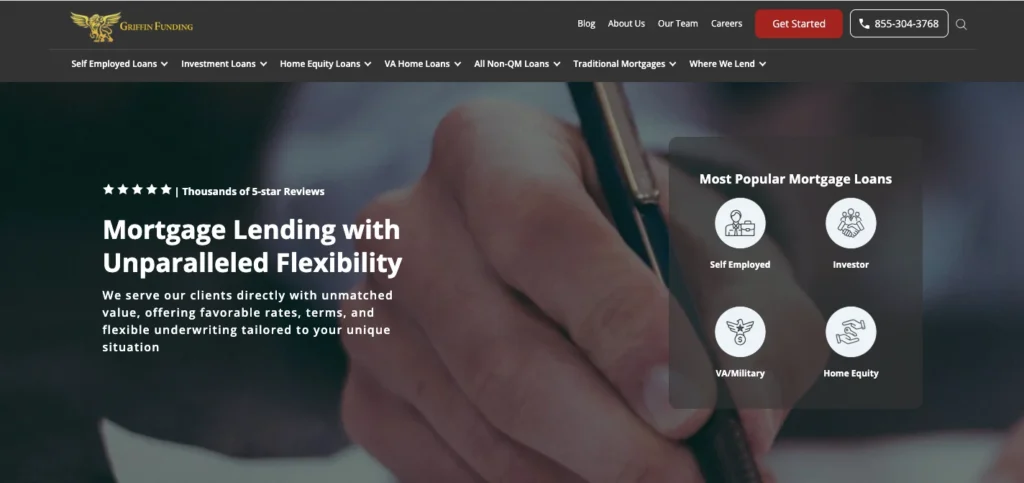
Minimum Down Payment: 10% for most self-employed mortgages, 20% for DSCR. Higher down payments may apply based on credit score.
Credit Score Range: 620-680.
Pros:
- Variety of non-QM loan options for self-employed borrowers.
- Flexible income verification (bank statements or P&L statements).
- Competitive interest rates and terms.
Cons:
- Higher down payments for some loans.
- Not all programs available in all states.
8. Deephaven Mortgage
Loan Types Offered: Expanded-Prime, Jumbo-Prime, Non-Prime, DSCR Loans, Equity Advantage.
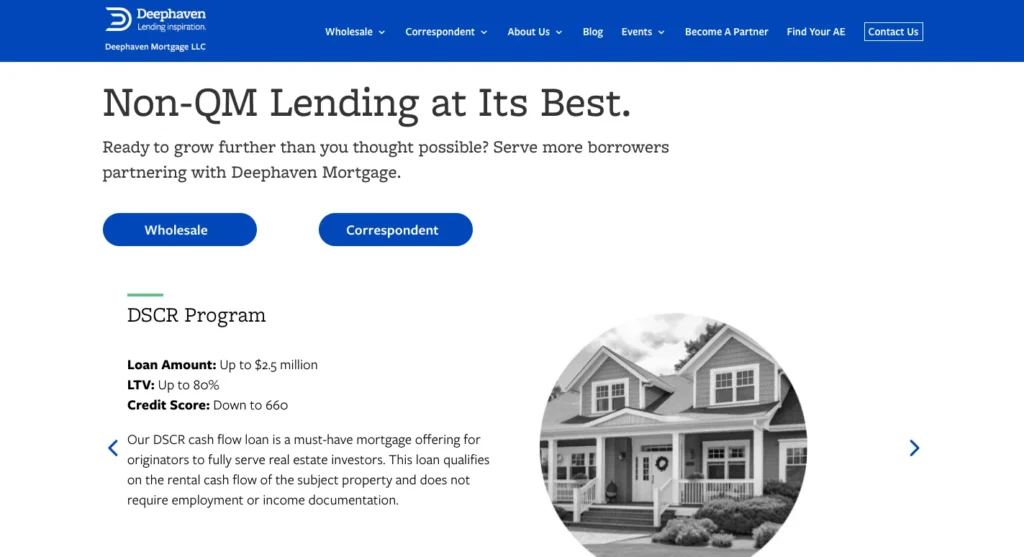
Minimum Down Payment: 20%, can go as low as 10% for Expanded-Prime and Jumbo-Prime.
Credit Score Range: 620-660
Pros:
- Specialized in non-QM loans for unique financial situations.
- Flexible income documentation (bank statements, 1099 forms).
- Offered through a network of 1,000+ mortgage brokers.
Cons:
- Must work through approved brokers.
- Loan terms vary by borrower and broker.
9. First National Bank of America (FNBA)
Loan Types Offered: NIVA (No Income Verified Assets) Program, Asset Depletion Program.

Minimum Down Payment: 15%.
Credit Score Range: Minimum 600, but borrowers with no credit score are also allowed up to 75% LTV.
Pros:
- Options for borrowers with limited or no credit history.
- Alternative income verification (bank statements, asset depletion).
- No reserve requirements for certain programs.
Cons:
- Higher down payment without credit score.
- Limited detail on loan terms.
10. Carrington Mortgage
Loan Types Offered: Carrington Flexible Advantage, Carrington Prime Advantage, Adjustable-Rate Mortgages.
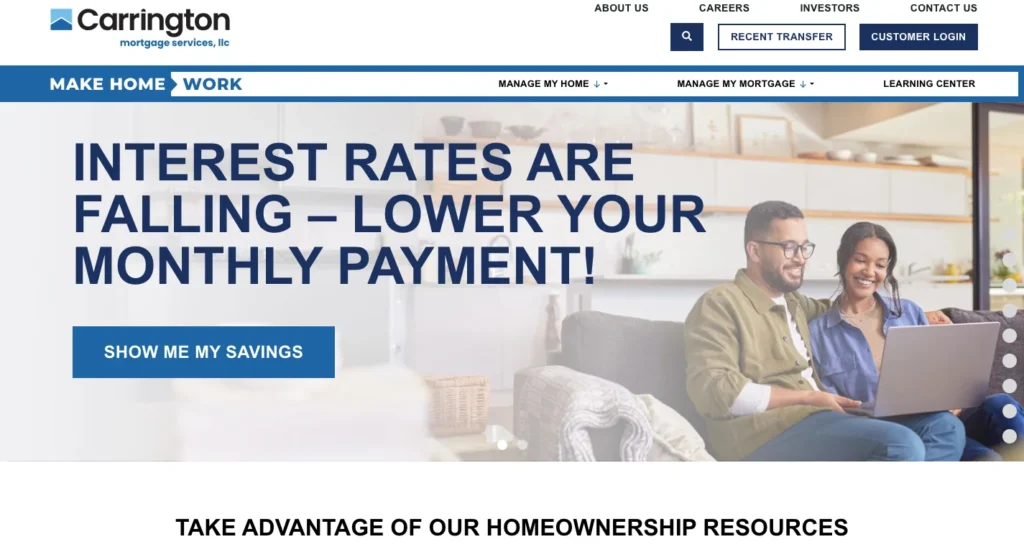
Minimum Down Payment: 10%.
Credit Score Range: 550-660.
Pros:
- Flexible programs for borrowers with low credit scores.
- Income verification using bank statements.
- Loan amounts up to $1.5 million for select programs.
Cons:
- Higher interest rates for low credit scores.
- Not all programs available nationwide.
11. Acra Lending
Loan Types Offered: 12-Month Bank Statement Loans, ATR-in-Full Loans, Business Purpose Loans, DSCR Loans, Investor Loans, 1099 Only Loans, P&L Programs (acralending.com)
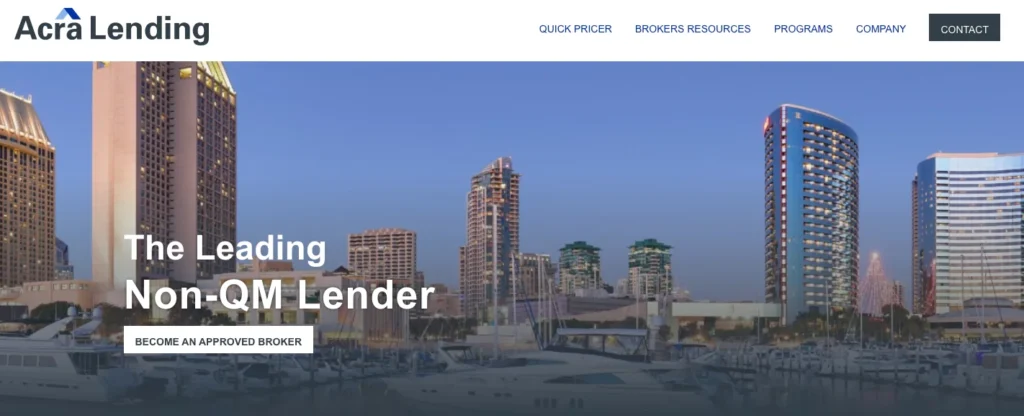
Minimum Down Payment: 15%.
Credit Score Range: 600-700.
Pros:
- Specializes in alternative income products for self-employed borrowers.
- Offers multiple non-QM options including bank statement and DSCR loans.
- Operates in 39 states plus DC.
Cons:
- Specific credit score and down payment requirements not disclosed.
- Loan availability may vary by state.
12. A&D Mortgage
Loan Types Offered: DSCR Loans, 12 or 24-Month Bank Statement Loans, 1 or 2-Year Profit & Loss (P&L) Loans, 1099 Loans, Asset Utilization Loans, Foreign National DSCR Loans.
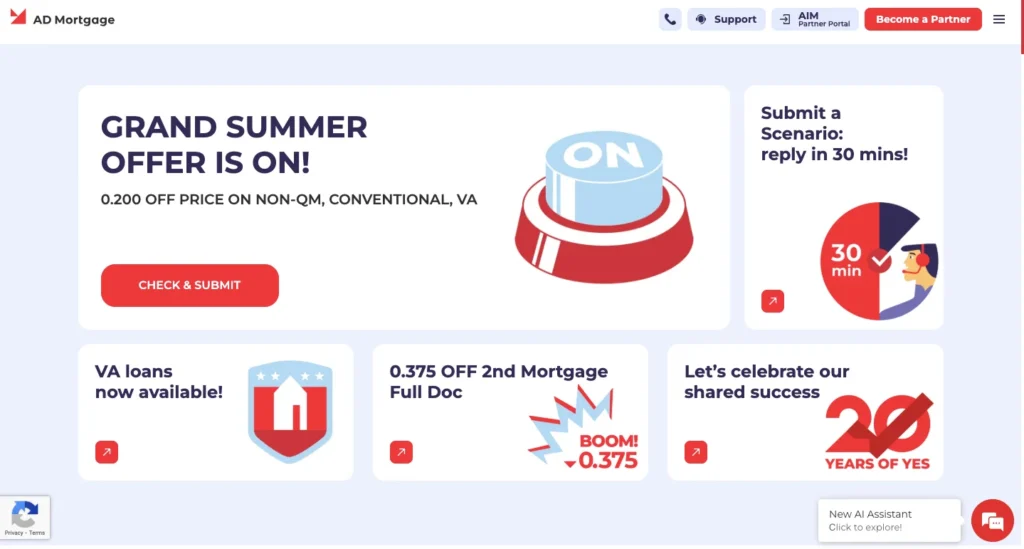
Minimum Down Payment: 10-20%.
Credit Score Range: 620-720, borrowers with no credit score allowed for bank statement loans.
Pros:
- Offers a wide range of self-employed mortgage programs.
- Flexible qualification options including bank statements and P&L documentation.
- Direct lender with presence in 42 states.
Cons:
- Specific loan terms and requirements vary by program.
- Limited disclosure of minimum down payment and credit score.
13. Guaranteed Rate
Loan Types Offered: Bank Statement, DSCR, Full Doc, ITIN, Self-Employed 1099
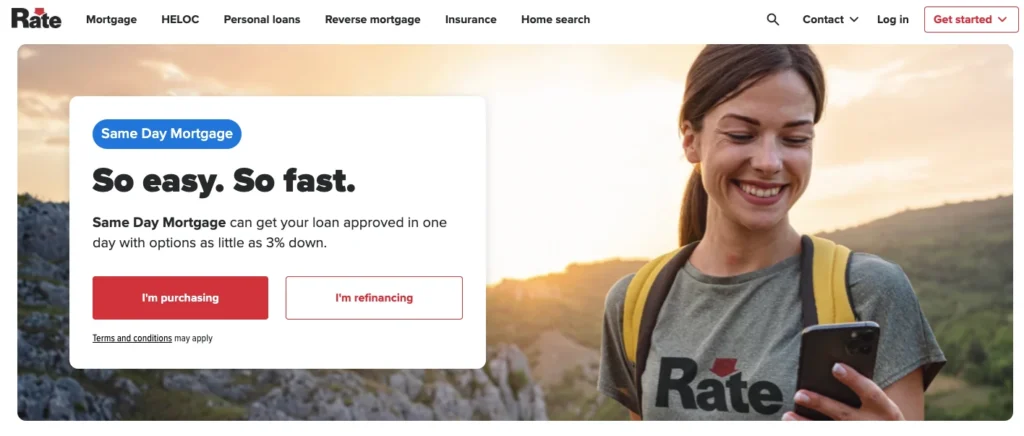
Minimum Down Payment: 10-20%.
Credit Score Range: 620-660.
Pros:
- Innovative “Proactive Mortgage Pod” model to speed up loan processing.
- Offers non-QM loans suitable for self-employed borrowers.
- Supports a variety of homeownership needs.
Cons:
- Fewer loan programs for self-employed individuals than other lenders.
- Limited information on down payment and credit requirements.
14. Change Home Mortgage
Loan Types Offered: Community Mortgages, Investor Programs, Alt-Doc Programs, Foreign National Mortgages

Minimum Down Payment: Not specified
Credit Score Range: Not specified
Pros:
- Focus on serving disadvantaged families and low- to moderate-income borrowers.
- Offers Alt-Doc programs for self-employed individuals.
- Community-oriented lender with nationwide reach.
Cons:
- Limited information on specific loan terms and eligibility.
- Not all programs may be available in every state.
15. United Wholesale Mortgage (UWM)
Loan Types Offered: Bank Statement Loans, DSCR Loans for real estate investors.
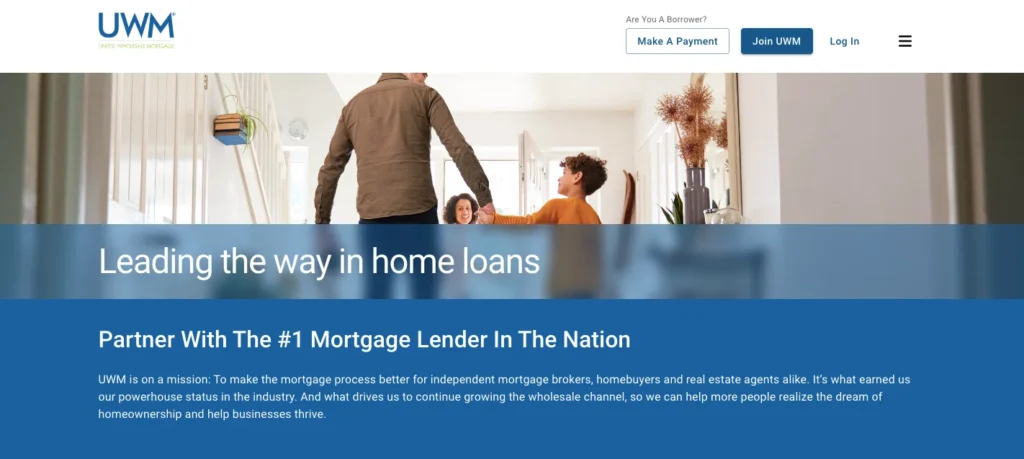
Minimum Down Payment: 10-25%.
Credit Score Range: 640-740.
Pros:
- Wide range of mortgage programs through wholesale network.
- Offers multiple loan options under Bank Statement and DSCR programs.
- Designed for real estate investors.
Cons:
- Only bank statement and DSCR loans available for self-employed borrowers.
- Specific eligibility and terms vary per loan product.
6 Steps to Get a Self-Employed Mortgage
Getting a mortgage when you’re self-employed requires a structured method. Here are some general steps you should follow in order to secure it successfully:
- Determine whether you classify as a self-employed individual: The first step is actually verifying your self-employed status. Lenders typically consider you self-employed if you own 25% or more of a business or receive the majority of your income from non-salaried sources. Most mortgage programs require at least two years of self-employment history; however, some may accept one year if you have a prior two-year track record in a related field with comparable income.
- Decide on a self-employed mortgage program: Once you’ve confirmed that you’re qualified for a self-employed mortgage, decide which loan option is right for you. Although you can still apply for conventional and government-backed mortgages, non-QM programs such as bank statement loans, P&L loans, and DSCR loans are often better-suited for individuals with unconventional income streams.
- Understand how lenders evaluate your self-employed income: Lenders typically take the past two or more years of your tax returns or bank statements to arrive at your average income from those years. They may also assess factors such as business structure, income consistency, and personal debt-to-income ratio (DTI) to determine whether you can repay the loan. You can refer to Fannie Mae’s Cash Flow Analysis Form 1084 or similar forms to help you anticipate lender underwriting processes.
- Estimate your qualified income: Mortgage lenders for self employed individuals typically assess net income, or the amount you make after deducting business expenses, instead of your gross income. By calculating your qualifying income in advance, you can project the proper loan size and the price range of your ideal property.
- Organize your documents: Thorough documentation is crucial to prove your income when self-employed. Lenders typically require your business licenses, if applicable, as well as two years of personal and business tax returns, profit and loss statements, and bank statements to assess income stability and business viability.
- Shop around for the best self-employed mortgage lender for your needs: Not all lenders are equally equipped to handle the self-employed mortgage application process. To find the best fit, compare several lenders, focusing on their experience with self-employed borrowers, your preferred loan programs, rates, flexibility in income verification methods, and customer service. A lender who understands the nuances of self-employment income (like Defy) can offer tailored solutions to meet your unique financial situation.
5 Tips to Put Your Best Application Forward
The standards that self-employed borrowers are held to can seem stricter than those applying for standard loans, but there are certain things you can do to maximize the chances of getting approved with good loan terms:
- Improve your financials: Enhancing your financial health is crucial for mortgage approval. Lenders favor applicants with a low debt-to-income (DTI) ratio (ideally below 43%), which you can achieve by paying down existing debts. This also helps you improve your credit score and credit utilization, which should be under 30%. Not taking on new debts before applying also assists with this.
- Help lenders understand your business: Be prepared to explain your business’s nature, operations, and any income fluctuations, as lenders will evaluate factors like business longevity, debt levels, and income trends to determine your ability to repay the loan.
- Separate your personal and business finances: Keeping distinct bank accounts and credit cards for personal and business finances helps keep your financial profile more organized, speeding up the underwriting process and increasing lender confidence.
- Temporarily reduce business tax deductions: While business deductions lower the taxes you have to pay, they also lower the total income reported on tax returns, which can be an issue if your chosen mortgage program relies on tax returns to gauge your income. You can sidestep this issue entirely by choosing a loan type that relies on other forms of income, such as a bank statement loan or a DSCR loan, but otherwise, you may have to hold off on tax deductions for a few months prior to applying for a mortgage to maximize the income you report in your application.
- Save up for a larger down payment: Depending on the lender and the type of mortgage, putting more money down can increase lender confidence and potentially reduce rates. It can also increase the total loan amount, allowing you to access higher-end properties. Even without these benefits, a larger down payment results in a lower principal, which ultimately reduces the overall cost of your mortgage or exempts you from having to pay private mortgage insurance (PMI).
Key Takeaways
Being self-employed doesn’t mean that you’re less qualified for a mortgage. Strategies like verifying your self-employed status, adjusting tax deductions, and separating personal and business finances can go a long way in strengthening your chances of approval. But more than that, selecting the right mortgage program and lender is what can truly position you for long-term financial success.
While each company in our list of the best mortgage lenders for self employed workers has built its reputation to help self-employed borrowers succeed, Defy distinguishes itself by offering highly personalized and creative solutions tailored specifically to self-employed individuals.
If you’re ready to take the next step, Defy is ready to assist you. Whether you’re a self-employed investor in need of a DSCR loan or a first-time homebuyer looking to use bank statements to qualify for a mortgage, our team can guide you through the mortgage process and find the program that best fits your unique financial situation. You can book a consultation with our mortgage experts, email us at team@defymortgage.com, or call us at (615) 622-1032. We’re always standing by to answer questions and provide personalized guidance.
And for mortgage brokers, Defy TPO offers the same specialized programs: DSCR, jumbo, and more, all designed to help you better serve clients and win deals that other lenders turn away. Partner with us to get these powerful tools in your arsenal, and expand your pipeline with confidence. Use our AI Pricer or send us your scenarios to get a quote today!
Best Mortgage Lenders For Self-Employed FAQ
Can I qualify for a mortgage if I’m self-employed?
Yes, self-employed individuals can qualify for a mortgage, but the documentation requirements are often more complex than for W2 employees. Many lenders now offer non-QM loan options specifically designed for self-employed borrowers.
How many years of self-employment do I need to get approved?
Most lenders prefer to see at least two years of consistent self-employment income. However, some may approve you with just one year if you have prior experience in the same field and strong financials.
What documents do self-employed borrowers need to provide?
Depending on the loan type, you may need to submit bank statements, 1099s, tax returns, profit and loss statements, and business licenses. Some lenders offer alternatives that don’t require full tax documentation.
Do self-employed mortgages have higher interest rates?
Not always, but they can. Since lenders perceive self-employment income as less stable, rates may be slightly higher. That said, borrowers with excellent credit, strong DSCR, and low DTI can still qualify for competitive rates.
Can I get a mortgage if I’ve been self-employed for less than two years?
It’s possible with some non-QM lenders. If you have strong credit and have been in the same industry for several years before going self-employed, certain lenders may make exceptions.
What types of mortgage loans are best for self-employed borrowers?
Some of the most common options include bank statement loans, 1099-only mortgages, DSCR loans for investors, and asset-based loans. These are designed to bypass traditional income verification methods.
Will applying for a self-employed mortgage affect my credit score?
The pre-qualification process with most lenders uses a soft credit check, which does not affect your score. However, a full application usually involves a hard inquiry, which may temporarily lower your score by a few points.
What’s the minimum credit score needed for a self-employed mortgage?
This varies by lender and loan type. Some non-QM lenders may work with credit scores as low as 620, while others require 680+. The higher your score, the better your terms.
Can I get a mortgage if I write off a lot of expenses on my taxes?
Yes, but it depends on how your income is calculated. If you deduct heavily and show low net income, you may not qualify with conventional lenders. In such cases, bank statement or asset depletion loans may be better options.
What are the advantages of using a lender that specializes in self-employed mortgages?
Specialized lenders understand the nuances of self-employed income. They offer more flexible documentation, faster underwriting, and loan structures that accommodate variable sources of income.

About the Author: Meet Todd Orlando, co-founder and CEO of Defy Mortgage and Defy TPO. With over 20 years of experience in banking and financial services at institutions like First Republic and Morgan Stanley, Todd has dedicated his career to broadening access to lending and revolutionizing the mortgage industry, particularly in the non-QM space.
In 2022, Todd launched Defy Mortgage to provide real estate investors, entrepreneurs, and self-employed individuals with a secure, streamlined, and personalized lending experience tailored to meet their specific needs. He knows firsthand how access to the right mortgage can make or break a project and how today’s borrowers need flexible financial partners and creative lending options designed for their unique needs and lifestyles. Traditional banks are rigid, and their one-size-fits-all approach is outdated. That’s why he created Defy Mortgage — to stay ahead of the curve, set new standards in lending, and deliver personalized, non-traditional solutions for those looking to purchase or refinance.
For the third year running, Todd has been recognized by Inman News for excellence in the mortgage and lending industry, landing on their prestigious Best of Finance list for 2025. He was also honored as a mortgage finance leader in 2023 and 2024 for the same award. His visionary leadership has earned him endorsements from esteemed former colleagues at prestigious institutions across the financial services spectrum.
Beyond his work in finance, Todd is also a co-founder of two software companies in commercial lending and healthcare tech, an active real estate investor, and a husband and father of three. An industry disruptor, Todd is here to redefine what’s possible in mortgage lending.
Mortgage broker itching to elevate client offerings? Check out our TPO business, Defy TPO: https://defytpo.com/




